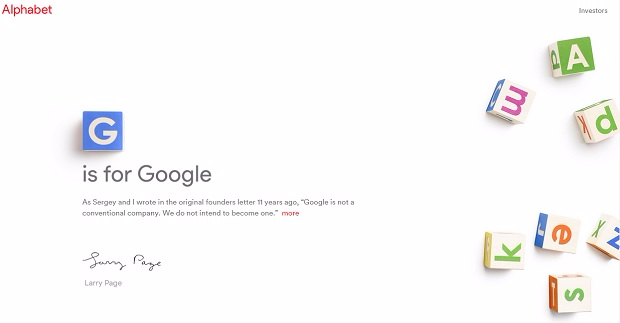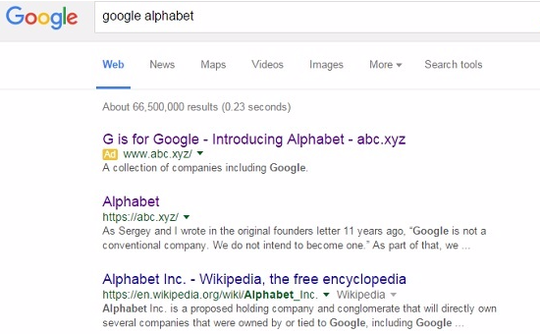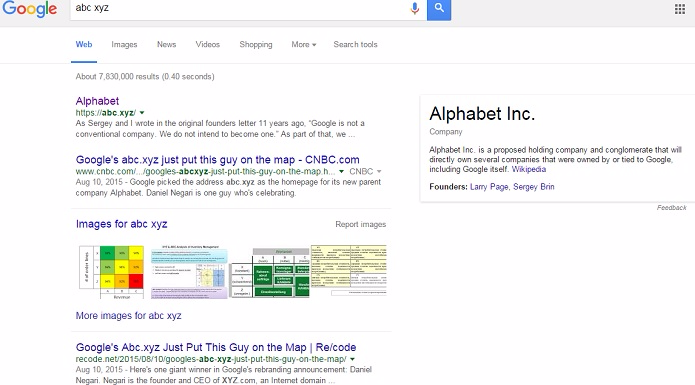Why Did Google Choose ABC.XYZ for the Alphabet Domain Name?
What is in a domain name? Rather than using one of its many top level domain options, Google took a different approach by making a new address for Alphabet Inc. - ABC.XYZ.
What is in a domain name? Rather than using one of its many top level domain options, Google took a different approach by making a new address for Alphabet Inc. - ABC.XYZ.
It’s a question many in both the SEO and domain name industry have been asking since it was announced recently.
If you go to ABC.XYZ, there is a letter from Larry Page about Google’s commitment to innovative ideas and why Alphabet Inc. spun off from Google Inc. There are many reasons to speculate on the SEO value of Google choosing this domain name.

Does it mean dot com is fully saturated and they couldn’t find anything – just like everyone else? Why didn’t Google choose a domain name in one of its own new top level domains – Google applied for 101.
Why wouldn’t they want to support their own spaces? While this doesn’t signal the end of dot com, it does show that there are new rules to naming on the internet – and Google has just shown everyone the way.
With thousands of top level domain possibilities, you really need to start by looking at the purpose of the company when choosing a name.
I think this is exactly what Google did. The purpose of this company is to separate out riskier investments from its core business, so they can paint a better financial picture to Wall Street.
In Larry Page’s letter he says:
We liked the name Alphabet because it means a collection of letters that represent language, one of humanity’s most important innovations, and is at the core of how we index with Google search.
With the name and purpose of Alphabet, it nicely ties to the concept of ABC and XYZ.
If you’re going to pick a domain name for that company, it’s actually quite clever to pick ABC.XYZ when a .XYZ top level domain is available. That fits perfectly, which is exactly the opportunity these new domains present to companies in this new era of naming.
I searched for “Alphabet” and found that Google is running an ad for its ABC.XYZ under the title G is for Google – abc.xyz.

Articles about this topic, including Google’s own blog, come up but the site itself doesn’t show up in organic rankings on page one yet, with that search query.
Google clearly didn’t give an organic boost to its own announcement, but rather paid for an ad like everyone else. I then searched for “abc xyz” and the site comes up top organically.

But that begs the question, if you know enough to search for “abc xyz,” then why not just go direct and bypass the search engine? Could that happen in the future if names are more memorable and simple?
It’s not the end of the dot com era, but is the beginning of a shift. We are still married to the concept of a dot com as the premiere domain name.
But Google’s departure from dot com, alongside its impressive portfolio of new gTLDs, certainly indicates this could change in the future.
The vast new name spaces means businesses no longer have to settle for a dot com that isn’t on point with its brand. Instead they can actually choose a name that is either cleverly representative of the company name – as Google did with ABC.XYZ – or directly relates to the type of business.
For example, you could choose a name that actually reflects what your business is about such as .RESTUARANT, .AGENCY, .PUB, .VENTURES, .PLUMBER, .STYLE, .SEXY or any of the thousands of other possibilities.
While we’re all still waiting to see how the algorithms respond to companies who choose a new top level domain, Google certainly did not see it as a risk.
In this new era of choosing domain names, the purpose of the company will certainly be one of the top considerations rather than just searching for something in dot com. From an SEO perspective, if it also happens to match what people search for, all the better.
With so many new options, you have a much better chance of finding a name that matches natural language tied to search strategies, as well as something that nicely fits with your brand and your messaging. Perhaps the ABCs of SEO are about to change.